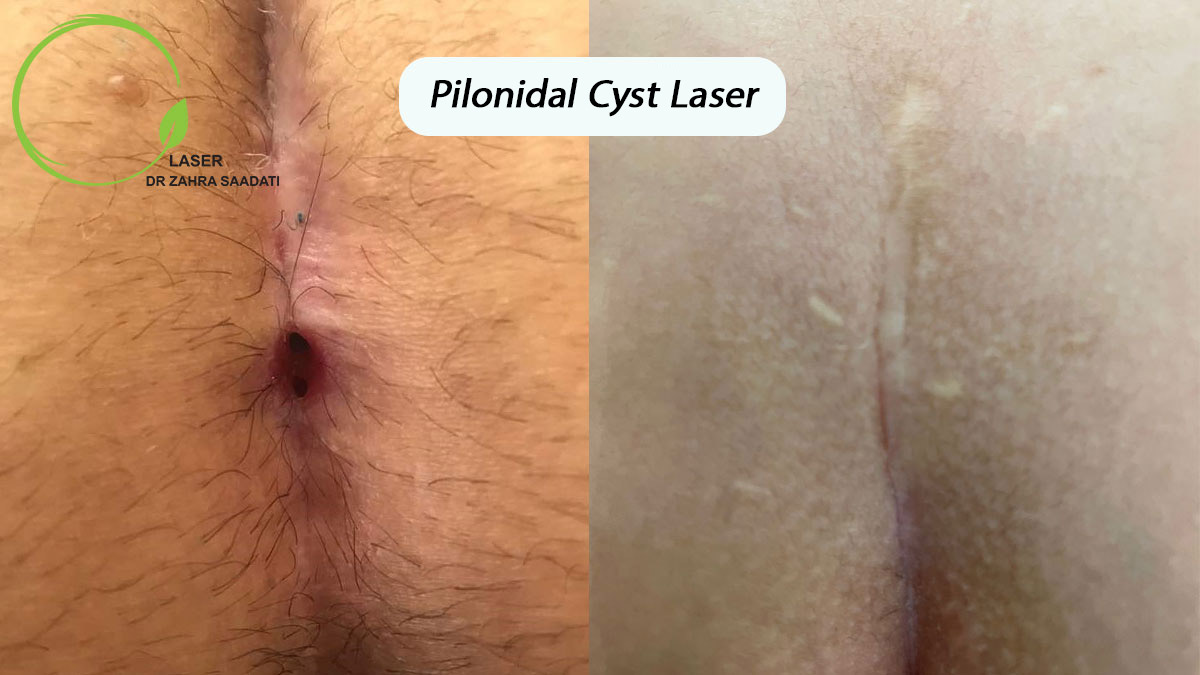Dr. Zahra Saadati, a general surgeon and laser surgery specialist, performs pilonidal cyst laser in Tehran. All cases of pilonidal cyst are treated in an outpatient procedure by using laser equipment. Even if a pilonidal cyst is accompanied by an anorectal abscess or fistula, patients need to rest at the laser clinic or home for only one night; they can return to normal life the next day.
If you treat your pilonidal cyst at Dr. Saadati Laser Clinic, you can be always in contact with us. You can be in touch with Dr. Saadati both in person and via WhatsApp. This clinic offers special conditions for women undergoing laser surgery. The patients who undergo surgery in this clinic will not be charged for removing stitches or postoperative visits. Patients who live in remote areas can visit Dr. Saadati online via WhatsApp.
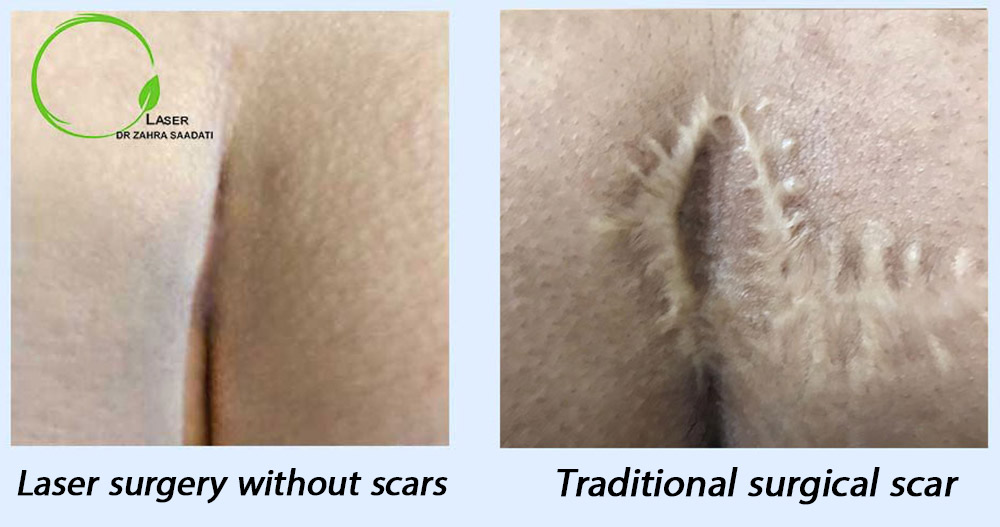
Advantages of pilonidal cyst laser in Tehran
Tehran was the first city in Iran where laser surgery was performed for the first time. Dr. Zahra Saadati, a general surgeon and laser surgery specialist, is the first female surgeon who has been performing laser surgery since 2007. However, many people in other cities and towns of Iran still have insufficient information about laser surgery.
There are different methods for treating pilonidal cyst , such as pilonidal cyst surgery or lase in Tehran. Each of these methods has its own advantages and disadvantages.
Unlike conventional surgery with blades and knives, pilonidal cyst laser is a less invasive procedure that causes the minimum pain and complications. Some of the advantages of pilonidal cyst laser in Tehran are as follows:
- The laser first makes the necessary incisions for draining and removing the pilonidal cyst and then repairs the end of affected vessels and nerves. Therefore, the patient experiences mild pain after surgery.
- Pilonidal cyst laser is an outpatient procedure that does not require general anesthesia.
- This procedure requires a very short length of stay (LOS), and most patients are discharged after two hours if there is no problem.
- Because of the outpatient nature of this procedure, patients can return no normal life and their workplaces very quickly.
- During pilonidal cyst laser, other anorectal diseases, such as hemorrhoids, fissures, and fistula, can be also treated.
- The risk of transmitting viral diseases, such as hepatitis and AIDS, during pilonidal cyst laser is almost zero because the operating room is sterile, the surgery causes no bleeding, and the laser equipment does not directly touch the tissue.
- This procedure does not damage or necrose the tissue around the pilonidal cyst. As a result, the patient experiences mild postoperative pain and a very short recovery period.
- Since the laser repairs lymphatic vessels, this procedure does not cause skin swelling and leaves no scar.
- Pilonidal cyst laser does not require wound dressing.
- Pilonidal cyst laser causes minimum bleeding because it repairs the affected small veins and nerves. Therefore, the patient does not need blood transfusion.
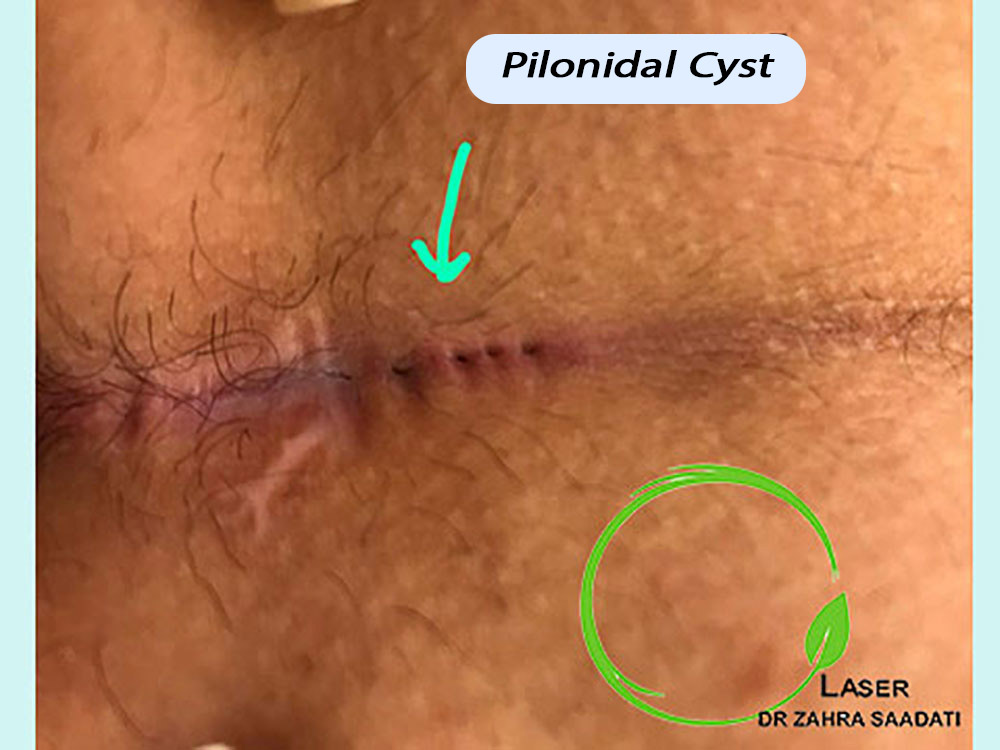
Since pilonidal cyst laser is a less invasive procedure, patients experience mild postoperative pain that can easily be relieved with simple painkillers. After pilonidal cyst laser, patients can return home after a few hours without the need for hospitalization. In the case of open surgery, it is only necessary that a nurse clean the surgical site and apply a pressure dressing. However, patients undergoing pilonidal sinus laser surgery do not need to tolerate strenuous dressings or incur extra pilonidal sinus costs.
All points mentioned above are among the advantages of pilonidal cyst laser in Tehran. If you are looking for a reliable and reputable center for treating your pilonidal cyst , you can contact us at Dr. Saadati Specialized Laser Clinic.
Laser application in pilonidal cyst treatment
The most common treatment of pilonidal cyst is surgery. However, laser therapy or laser surgery are currently more recommended for treating pilonidal cyst.
Pilonidal cyst laser is performed using low-power or high-power lasers. In this method, laser fibers are placed on the path of a pilonidal cyst’s fistula to destroy its cysts and tunnels. Since the tight texture of hair causes inflammation and irritation around the reversely grown hair, laser therapy or laser surgery can prevent this condition and permanently treat the pilonidal sinus.
Since pilonidal cyst laser had receive great attention from both patients and physicians, it is recommended to use laser surgery or laser therapy to treat all anorectal diseases, including anal fistula, in a single session.
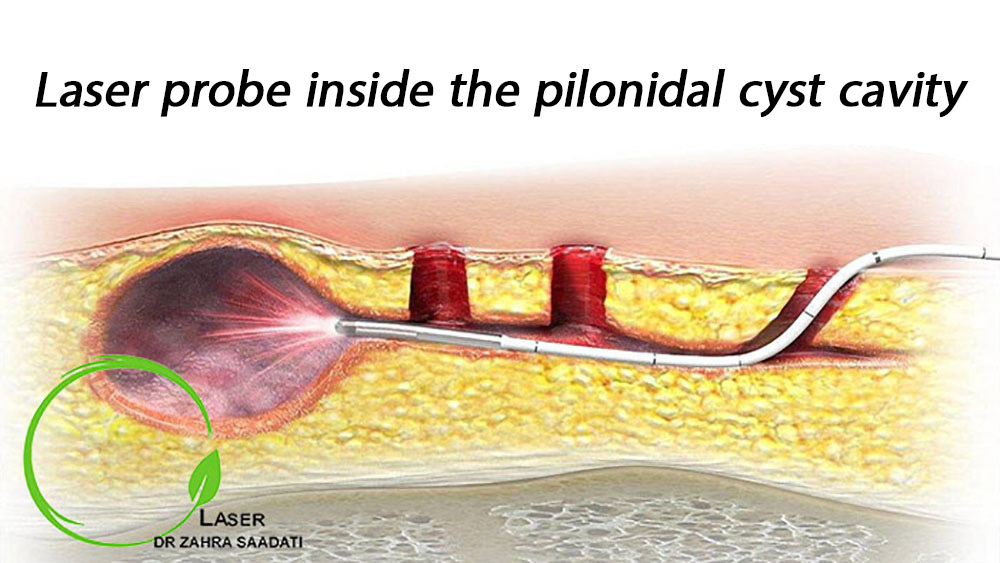
Different types of lasers used for treating pilonidal cyst are as follows:
- Low-power laser for emitting laser into the pilonidal cyst without cutting the tissue
- High-power laser for cutting the pilonidal cyst and draining the cyst wall
- Alexandrite lasers or laser diode for removing excess hair on the skin to prevent the recurrence of pilonidal sinus
- Infrared (IR) lasers for repairing the surgical wound of a pilonidal cyst . If Dr. Saadati performs closed surgery for you, there will be no need for laser therapy to repair wounds because this procedure leaves no surgical scar or wound.
Procedure for pilonidal cyst laser
Pilonidal cyst surgery may be performed either open or closed depending on the surgeon’s discretion and proficiency. Surgeons may use different laser devices or voltages for pilonidal sinus laser.
Some surgeons may first cut the pilonidal cyst and drain its purulent discharges and then perform laser surgery to completely remove it. When the surgical wound is sutured after surgery, it is called pilonidal cyst closed laser surgery. This procedure requires high skill and experience.
Patients do not need to take antibiotics before pilonidal cyst laser surgery, unless there is an anorectal abscess or another problem. In such cases, the abscess should be drained before surgery and then the patient should take antibiotics. After reducing swelling and inflammation, the surgeon performs pilonidal cyst laser surgery.
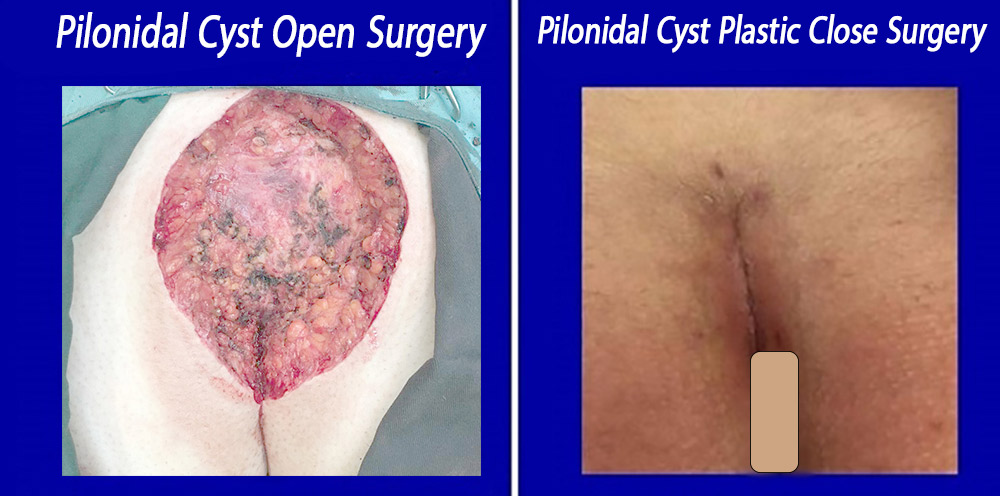
Pilonidal cyst laser surgery is often done under local anesthesia, but some cases require general anesthesia. The patients are asked to shave the area before surgery in order to prevent possible infection. The general surgeon also cleans the area before starting the procedure.
To avoid burning the surrounding tissues, the surgeon usually injects some normal saline around the tunnel of the pilonidal cyst to keep the area cool.
The surgeon selects the laser probe based on the size of the pilonidal cyst tunnel. The surgeon inserts the laser probe into the tunnel to destroy extra tissues. The surgical procedure finishes if the tunnel is closed. Otherwise, the surgeon repeats the procedure and then covers the tunnel using a pressure dressing.
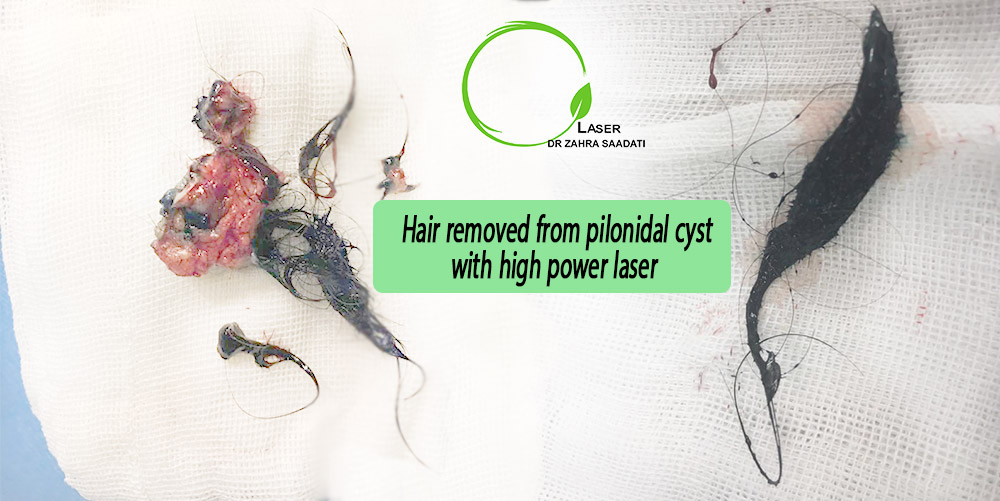
How much does pilonidal cyst laser cost?
Since pilonidal cyst laser surgery is not performed in public hospitals, you cannot use the free services of these hospitals for this surgery. In addition, public hospitals perform only pilonidal cyst open surgery and do not offer closed or plastic surgery services. The cost of pilonidal cyst laser surgery in private medical centers and clinics depends on the surgery method: open or closed.
An experienced and proficient general surgeon and laser surgery specialist can perform this surgery for you in the best possible way. Dr. Saadati has been performing pilonidal cyst closed laser surgery in her clinic since 2005. None of her patients has reported the recurrence of this disease after surgery. Therefore, closed and plastic pilonidal cyst laser surgery is more cost-effective than conventional surgery.
Unfortunately, insurance companies do not completely cover pilonidal cyst laser because this procedure is categorized as cosmetic laser therapy.
A video of pilonidal cyst surgery
Frequently asked questions (FAQs) about pilonidal cyst laser in Tehran
1-How to choose the best pilonidal cyst laser clinic?
Knowing about the experience and proficiency of a general surgeon and laser surgery specialist can help you to choose the best clinic for pilonidal cyst surgery or laser surgery. The best choice for you is a general surgeon and laser surgery specialist who is proficient and experienced in pilonidal cyst closed surgery with different lasers. The best clinics shall employ the most advanced methods for the treatment of pilonidal cyst with the minimum risk of recurrence and no surgical scar or wound. To get more information, you can contact Dr. Saadati’s office at 0098 22761600.
2-Is pilonidal cyst laser a painful procedure?
Since pilonidal cyst laser is performed under general or spinal anesthesia, the patient feels no pain during the procedure. The patients who undergo pilonidal cyst closed laser surgery do not feel the pain caused by surgical wounds or dressing, unlike those who undergo open surgery.
3-Is laser hair removal suitable for preventing and treating pilonidal cyst?
If you have a pilonidal cyst , laser hair removal cannot help to completely treat this disease. The definitive treatment of pilonidal cyst is the surgical drainage of the cyst. Laser hair removal helps to prevent the recurrence of this disease after surgery. In addition, if you are prone to pilonidal cyst , laser hair removal can help you prevent this disease.
4-Is there a risk of recurrence after pilonidal cyst laser?
Pilonidal cyst laser surgery considerably reduces the risk of recurrence, compared to conventional surgery. You can be sure that your pilonidal cyst will not recur if it is treated through closed surgery using a high-power laser by an experienced general surgeon and laser surgery specialist. The only thing you need to do after such a surgical procedure is to remove the excess hair from the affected area.
5-Which one is a better choice: pilonidal cyst laser or conventional surgery with blade and cauter?
The risk of infections and recurrence is higher in open surgery because the surgical wound is left open. This risk will be much higher if the wound dressing is not changed properly at the right time. Moreover, conventional surgery requires very time-consuming and exhausting postoperative care and recovery period for today’s modern man. By contrast, the patients who undergo pilonidal cyst surgery with high-power surgery do not need to change wound dressing every day or rest at home for a long time. This very short recovery period and quick healing minimize the risk of recurrence. Therefore, this method is preferable to open surgery with blades and cauters.
6-Is pilonidal cyst laser an effective treatment?
Pilonidal cyst surgery with a high-power laser is the most effective treatment for this disease because it can drain and destroy the cyst wall. Surgery with a low-power laser alone cannot be effective in this regard.
7-How long is the recovery period after pilonidal cyst laser?
If pilonidal cyst laser is performed through closed surgery and the wound is not left open, the patient needs to rest at home for only one night. In addition, depending on the surgery extent and the patient’s physiological conditions, it takes about 3 to 7 days for the patient to return to the workplace. Students can also return to educational centers after this period, but they should avoid sitting on the surgical site for a long time and try to apply most of their weight to their thighs.


